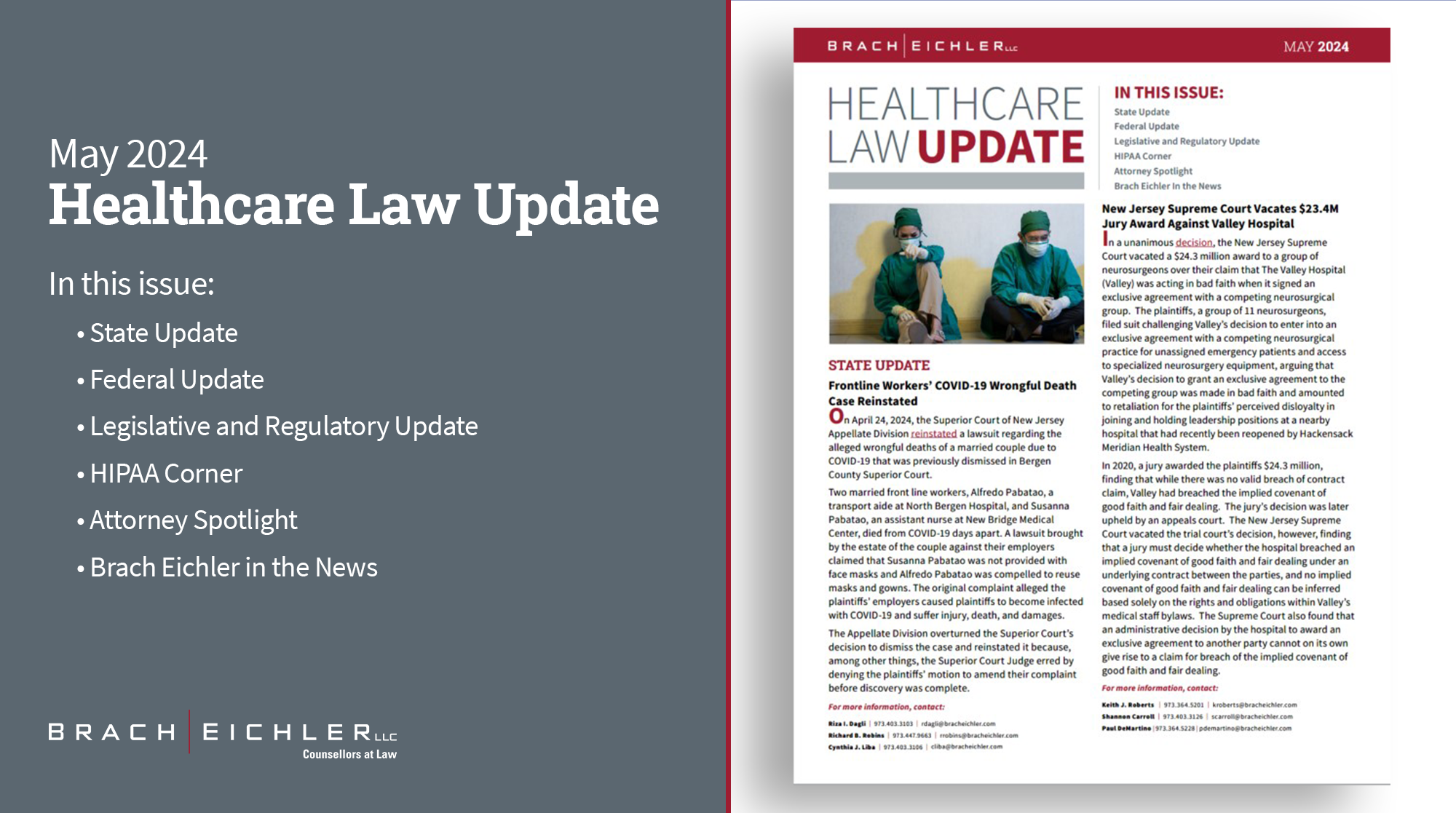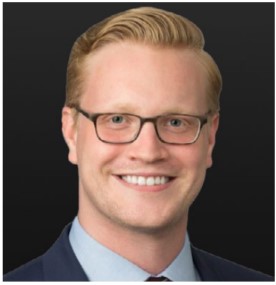
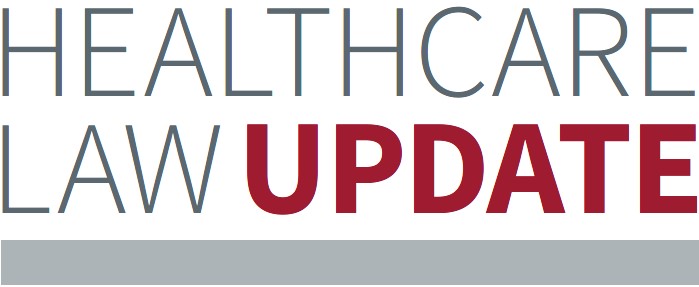
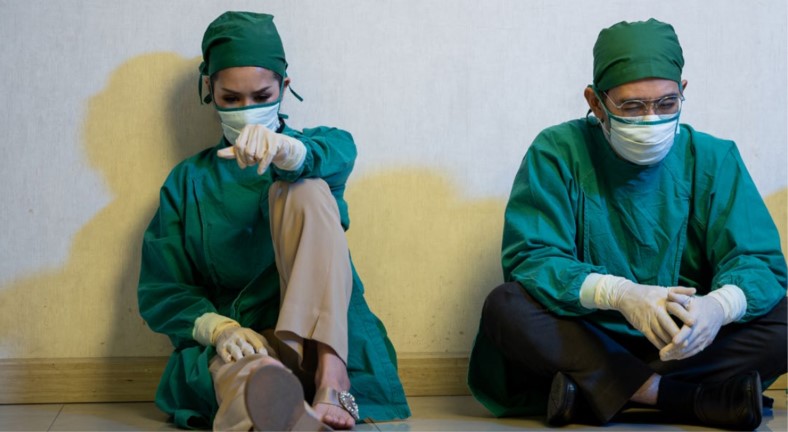
On April 24, 2024, the Superior Court of New Jersey Appellate Division reinstated a lawsuit regarding the alleged wrongful deaths of a married couple due to COVID-19 that was previously dismissed in Bergen County Superior Court.
Two married front line workers, Alfredo Pabatao, a transport aide at North Bergen Hospital, and Susanna Pabatao, an assistant nurse at New Bridge Medical Center, died from COVID-19 days apart. A lawsuit brought by the estate of the couple against their employers claimed that Susanna Pabatao was not provided with face masks and Alfredo Pabatao was compelled to reuse masks and gowns. The original complaint alleged the plaintiffs’ employers caused plaintiffs to become infected with COVID-19 and suffer injury, death, and damages.
The Appellate Division overturned the Superior Court’s decision to dismiss the case and reinstated it because, among other things, the Superior Court Judge erred by denying the plaintiffs’ motion to amend their complaint before discovery was complete.
For more information, contact:
Riza I. Dagli | 973.403.3103 | rdagli@bracheichler.com
Richard B. Robins | 973.447.9663 | rrobins@bracheichler.com
Cynthia J. Liba | 973.403.3106 | cliba@bracheichler.com
In a unanimous decision, the New Jersey Supreme Court vacated a $24.3 million award to a group of neurosurgeons over their claim that The Valley Hospital (Valley) was acting in bad faith when it signed an exclusive agreement with a competing neurosurgical group. The plaintiffs, a group of 11 neurosurgeons, filed suit challenging Valley’s decision to enter into an exclusive agreement with a competing neurosurgical practice for unassigned emergency patients and access to specialized neurosurgery equipment, arguing that Valley’s decision to grant an exclusive agreement to the competing group was made in bad faith and amounted to retaliation for the plaintiffs’ perceived disloyalty in joining and holding leadership positions at a nearby hospital that had recently been reopened by Hackensack Meridian Health System.
In 2020, a jury awarded the plaintiffs $24.3 million, finding that while there was no valid breach of contract claim, Valley had breached the implied covenant of good faith and fair dealing. The jury’s decision was later upheld by an appeals court. The New Jersey Supreme Court vacated the trial court’s decision, however, finding that a jury must decide whether the hospital breached an implied covenant of good faith and fair dealing under an underlying contract between the parties, and no implied covenant of good faith and fair dealing can be inferred based solely on the rights and obligations within Valley’s medical staff bylaws. The Supreme Court also found that an administrative decision by the hospital to award an exclusive agreement to another party cannot on its own give rise to a claim for breach of the implied covenant of good faith and fair dealing.
For more information, contact:
Keith J. Roberts | 973.364.5201 | kroberts@bracheichler.com
Shannon Carroll | 973.403.3126 | scarroll@bracheichler.com
Paul DeMartino | 973.364.5228 | pdemartino@bracheichler.com
On April 11, 2024, the Department of Health and Human Services, Office of Inspector General (OIG) issued a favorable advisory opinion regarding an arrangement where a not-for-profit organization would provide financial assistance to needy patients with rare diseases (Disease Funds) that would be funded by drug manufacturers (Donors) that produce drugs to combat these diseases. The OIG concluded that under the current Medicare Part D cost-sharing structure, this arrangement would not warrant sanctions, although the arrangement would generate prohibited remuneration under the Federal Anti-Kickback Statute if the requisite intent were present.
The OIG identified two reasons why sanctions are unwarranted for this arrangement:
1. Despite raising Federal Anti-Kickback Statute concerns and potentially being a conduit for payment by a Donor to a patient, the arrangement incorporates features that mitigate fraud and abuse risks. These features include defining Disease Funds based on established disease states, awarding assistance irrespective of specific treatment regimens, limiting information sharing with Donors, and implementing a stringent financial eligibility process.
2. The Disease Funds offer potentially impactful support amid rising prescription drug costs. Notably, over two-thirds of the funds are allocated to various forms of assistance besides the purchase of Donors’ drugs. These include cost-sharing for non-drug items and services, medical aid, premium support, and emergency relief, underscoring the comprehensive nature of the support provided by the arrangement beyond solely pharmaceutical assistance.
The OIG notes that its opinion is effective until January 1, 2027 and will be subject to future modifications to the Medicare Part D program.
For more information, contact:
Carol Grelecki | 973.403.3140 | cgrelecki@bracheichler.com
Edward J. Yun | 973.364.5229 | eyun@bracheichler.com
Vanessa Coleman | 973.364.5208 | vcoleman@bracheichler.com
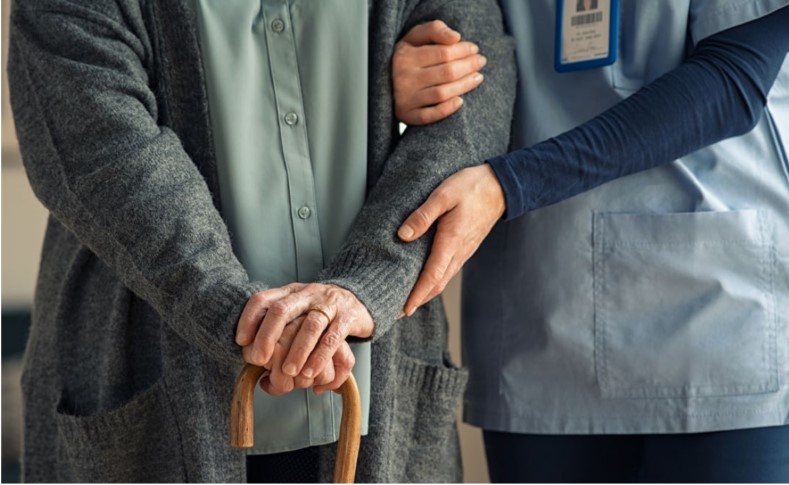
On April 22, 2024, the Centers for Medicare & Medicaid issued a final rule that, among other things, establishes a national minimum staffing requirement for nursing homes participating in Medicare and Medicaid. As a result, nursing homes will be required to follow designated nurse staffing standards including the following:
• Provide residents with nursing care for a minimum of 3.48 hours per resident day (HPRD), including at least 0.55 HPRD from registered nurses and 2.45 HPRD from nurse aides.
• Have a registered nurse on site 24 hours per day, seven days per week, to help mitigate against preventable safety events and deliver critical care to residents at any time.
• Conduct an enhanced annual facility assessment to improve the planning and identification of the resources and supports needed to care for residents based on their acuity during both normal operations and emergencies.
• Develop a staffing plan to maximize recruitment and retention.
Compliance with the staffing requirements in the final rule will be staggered over a period of up to 5 years for rural facilities and 3 years for non-rural facilities. The final rule also provides for exemptions if certain criteria are met, such as a good faith effort by the facility to hire and retain staff.
For more information, contact:
Isabelle Bibet-Kalinyak, Vice Chair | 973.403.3131 | ibibetkalinyak@bracheichler.com
Edward Hilzenrath | 973.403.3114 | ehilzenrath@bracheichler.com
Cynthia J. Liba | 973.403.3106 | cliba@bracheichler.com
On May 6, 2024, the U.S. Department of Health and Human Services, Office for Civil Rights and the Centers for Medicare and Medicaid Services issued a final rule intended to strengthen nondiscrimination protections and advance civil rights in healthcare. The final rule was promulgated in part in response to the previous administration’s actions to limit discrimination protections under Section 1557 of the Affordable Care Act. The rule is largely directed towards federal health agencies and health insurance companies participating in the federal and state exchanges, and will impact coverage for services rendered by providers who participate in those plans and providers that receive Medicare Part B funds.
The final rule clarifies that individuals may not be discriminated against on the basis of sex, which now formally includes discrimination on the basis of sexual orientation and gender identity. In addition, those covered by the rule, including providers, are required to notify patients that language assistance and related services are available free of charge. The required notice must be publicly posted and be written in English and in the 15 most common languages spoken by people with limited English proficiency in the state served. The final rule also provides that if a patient care decision support tool is utilized, such as an artificial intelligence product, the user of the tool must take steps to identify and mitigate any incidental discrimination that may result from using such a tool.
For more information, contact:
John D. Fanburg, Chair | 973.403.3107 | jfanburg@bracheichler.com
Jonathan J. Walzman | 973.403.3120 | jwalzman@bracheichler.com
Andrew Kuder | 973.403.3141 | akuder@bracheichler.com
On May 9, 2024, the U.S. Department of Health and Human Services (HHS), Office for Civil Rights published a final rule updating decades old regulations implementing healthcare related provisions of Section 504 of the Rehabilitation Act of 1973, which prohibits discrimination on the basis of disability in programs receiving federal financial assistance, as well as those conducted by federal agencies. The final rule impacts
anyone receiving federal financial assistance, including any grant, loan, contract, or any other arrangement where HHS provides funds, the services of personnel, or the use or transfer of property for less than fair market value. The final rule addresses a range of patient care services for covered people and entities. For example, websites must meet certain standards for disability accessibility that align with the Americans with Disabilities Act. Medical equipment, such as exam tables, mammography machines, and weight scales, must be accessible to persons with disabilities. The rule also provides that, under certain circumstances, service animals must be permitted, as well as mobility devices, such as wheelchairs, segways, and golf carts.
For more information, contact:
Joseph M. Gorrell | 973.403.3112 | jgorrell@bracheichler.com
Jonathan J. Walzman | 973.403.3120 | jwalzman@bracheichler.com
Andrew Kuder | 973.403.3141 | akuder@bracheichler.com
Senate Bill 3166, introduced in the New Jersey Senate on May 9, 2024, would require temporary nurse staffing agencies that provide temporary nurses to licensed health care facilities to register annually as a nurse staffing agency with the Division of Consumer Affairs in the Department of Law and Public Safety. The Bill would further require that the agencies employ nurses who are properly credentialed and cap the service rates at 150% of the regional hourly wage, as determined by the most current US Department of Labor Bureau of Labor Statistics wage estimates. Agencies would also be prohibited from: 1) recruiting employees from client facilities and 2) including contract terms that restrict employees from being hired by a client facility or impose penalties for that employment.
Senate Bill 1984, introduced in the New Jersey Senate on January 9, 2024, and amended on May 9, 2024, would require hospitals to publish a list of standard charges for certain items and services. The Bill would require the New Jersey Department of Health (DOH) to evaluate whether a hospital has complied with the Bill’s requirements and if deficient the DOH may take
any of the following actions: 1) provide a written warning notice to a hospital of a specific violation; 2) request a corrective action plan; or 3) impose a civil monetary penalty. The amended Bill seeks to make the requirements mirror the requirements imposed by the federal hospital transparency requirements under 45 C.F.R. Part 180.
Senate Bill 4333, introduced in the New Jersey Senate on May 10, 2024, would require that contracts between a healthcare provider and a carrier provide six months’ notice in advance of any change in the policy that could result in a denial of coverage for services provided by the healthcare provider to covered persons. A carrier would be defined as an insurance company, medical service corporation, Medicaid, or health maintenance organization authorized to issue health benefit plans within New Jersey.

Assembly Bill 4328, introduced in the New Jersey Assembly on May 10, 2024, would enter New Jersey into the Interstate Physician Assistant Licensure Compact, which would allow physician assistants whose primary state of residence is New Jersey to apply for a multistate license and provide medical services as a physician assistant in states participating in the Compact. As of April 2024, Washington, Utah, Nebraska, Wisconsin, Virginia, West Virginia and Delaware have elected to participate in the Physician Assistant Licensure Compact.
The Louisa Carman Medical Debt Relief Act, introduced in the New Jersey Assembly on February 27, 2024, was amended on May 20, 2024 by the Assembly Financial Institutions and Insurance Committee. As amended, the Act would prohibit: 1) charging an interest rate of more than 3% on medical debt; 2) reporting medical debt to a consumer reporting agency; 3) creating a consumer report for a medical debt worth less than $500; 4) garnishing an individual’s wages to collect medical debt; or 5) placing a lien on an individual’s primary residence or personal property to collect medical debt.
For more information, contact:
John D. Fanburg, Chair | 973.403.3107 | jfanburg@bracheichler.com
Edward Hilzenrath | 973.403.3114 | ehilzenrath@bracheichler.com
Erika R. Marshall | 973.364.5236 | emarshall@bracheichler.com
On May 9, 2024, Ascension, a large Catholic health system headquartered in Missouri, announced to the media that on the prior day it “detected unusual activity on select technology network systems, which we now believe is due to a cybersecurity event.” At that time, Ascension was in the early stages of its investigation and remedial actions. Ascension has continued to provide updates since the announcement. The cybersecurity event resulted in various systems becoming unavailable, including the electronic health records system, some phone systems and certain other systems utilized to order certain tests, procedures and medications. The health system continues to work to re-establish system capabilities and take actions to further investigate and remediate the event.
This attack occurred on the heels of the Change Healthcare cyberattack that occurred in February of this year, which has had far-reaching consequences. UnitedHealth Group continues to respond to and mitigate that attack.
If you need assistance with your HIPAA compliance program, an OCR investigation, or a data breach incident, please contact:
Lani M. Dornfeld, CHPC | 973.403.3136 | ldornfeld@bracheichler.com
Get to know the faces and stories of the people behind the articles in each issue. This month, we invite you to meet Member Edward Yun and Associate Andrew Kuder.
What is an interesting trend in Healthcare Law?
The growing demand for healthcare services at a time when there are fewer and fewer healthcare professionals. As the healthcare workforce continues to shrink, new methods, efficiencies, and technologies will need to be developed to satisfy demand.
What achievement are you most proud of?
One recent achievement I am proud of is overcoming my fear of heights, although it is an ongoing battle. By going on hikes that gradually push my comfort zone, I have been able to control my fear. I am still amazed at having hiked the Huayna Picchu trail in Machu Picchu, Beehive trail in Acadia National Park, and Breakneck Ridge trail in New York.
What is an interesting trend in Healthcare Law?
During the COVID-19 pandemic and the public health emergency, many providers transitioned to offering services via telemedicine, and many new companies were started in the telemedicine space. As we move past COVID-19, these technologies have provided a significant opportunity for providers to not only offer more convenient services for patients, but also to see an uptick in their bottom line for a number of reasons, including patients making appointments more frequently and the wider array of patients the provider can treat. The risk here is enforcement action for non-compliance, such as not having proper consents and authorizations in place, overprescribing certain medications, and an overall lack of understanding what a provider is required to do to be compliant when offering telemedicine. Enforcement in the telemedicine space was big for telemedicine companies in 2022 and 2023, and understanding how that will impact traditional providers this year and next is something to keep an eye on.
What achievement are you most proud of?
In my professional life, the thing I am most proud of is helping providers offer the best care possible, resulting in better outcomes for patients. My journey to practicing health law started with assisting disabled veterans get the health benefits and medical care that they needed during times of need. Since that start, working with providers of every size across a spectrum of specialties and care delivery methods, the greatest achievements have always been centered on partnering with providers to make strategic decisions, such as how to handle a HIPAA breach, or how to hire an excellent new member on staff, or what business arrangements lead to a compliant business model. At the core of each of these decisions is how to run better, more streamlined health care business and ensure better patient outcomes.

Join us May 30, for a webinar entitled “NJ Domestic Workers’ Bill of Rights Law Goes Into Effect Soon – Prepare Now!” presented by Healthcare Law Member Lani Dornfeld.
On May 23, Brach Eichler Managing Member and Healthcare Law Chair John D. Fanburg and Vice Chair Isabelle Bibet-Kalinyak will be on the “Ask the Experts” panel at the NJAASC Annual Meeting.
On May 20, Brach Eichler Healthcare law Member and Litigation Chair Keith Roberts, produced a podcast entitled “A Primer on the New FTC Non-Compete Clause Rule.”
On May 10, Brach Eichler Managing Member and Healthcare Law Chair John D. Fanburg as Moderator along with Healthcare Members Carol Grelecki, Keith Roberts and Employment Law Member Jay Sabin, presented a webinar entitled “FTC Adopts Final Rule Banning Workplace Non-Competes Webinar” and produced an alert entitled “FTC Adopts Final Rule Banning Workplace Non-Competes.”
On April 24, Healthcare Law Member Lani Dornfeld issued a law alert entitled “HIPAA Privacy Rule to Support Reproductive Health Care Privacy – Final Rule.”
On April 15, Healthcare Law Associate Andrew Kuder joined the firm. Congratulations!

Attorney Advertising: This publication is designed to provide Brach Eichler LLC clients and
contacts with information they can use to more effectively manage their businesses. The contents
of this publication are for informational purposes only. Neither this publication nor the lawyers who
authored it are rendering legal or other professional advice or opinions on specific facts or matters.
Brach Eichler LLC assumes no liability in connection with the use of this publication.

Shannon Carroll | 973.403.3126 | scarroll@bracheichler.com
Riza I. Dagli | 973.403.3103 | rdagli@bracheichler.com
Lani M. Dornfeld | 973.403.3136 | ldornfeld@bracheichler.com
John D. Fanburg, Chair | 973.403.3107 | jfanburg@bracheichler.com
Joseph A. Ferino | 973.364.8351 | jferino@bracheichler.com
Joseph M. Gorrell | 973.403.3112 | jgorrell@bracheichler.com
Edward Hilzenrath, HLU Editor | 973.403.3114 | ehilzenrath@bracheichler.com
Keith J. Roberts | 973.364.5201 | kroberts@bracheichler.com
Richard B. Robins | 973.447.9663 | rrobins@bracheichler.com
Jonathan J. Walzman | 973.403.3120 | jwalzman@bracheichler.com
Edward J. Yun | 973.364.5229 | eyun@bracheichler.com
Paul J. DeMartino, Jr. | 973.364.5228 | pdemartino@bracheichler.com
Michael C. Foster | 973.403.3102 | mfoster@bracheichler.com
Cynthia J. Liba | 973.403.3106 | cliba@bracheichler.com
Erika R. Marshall | 973.364.5236 | emarshall@bracheichler.com
Roseland, NJ | New York, NY | West Palm Beach, FL | www.bracheichler.com | 973.228.5700


